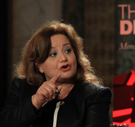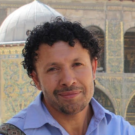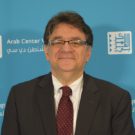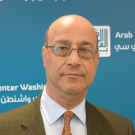Speakers

Raoudha Ben Othman
Professor of Linguistics
University of Tunis

Larbi Sadiki
Professor
College of Arts and Sciences, Qatar University

Sarah Yerkes
Senior Fellow
Middle East Program, Carnegie Endowment for International Peace
Moderator
Event Summary
On August 13, 2020, Arab Center Washington DC (ACW) hosted a webinar titled “Political Wrangling in Tunisia: The Democratization Process a Decade after the Arab Spring.” It featured Raoudha Ben Othman,Professor of Linguistics at the University of Tunis; Daniel Brumberg,Professor and Director of Georgetown University’s Democracy and Governance Program, and ACW Nonresident Senior Fellow; Larbi Sadiki, Professor at the College of Arts and Sciences, Qatar University; and Sarah Yerkes,Senior Fellow in the Middle East Program, Carnegie Endowment for International Peace. Imad K. Harb, ACWDirector of Research and Analysis, served as moderator.
Larbi Sadiki addressed the crisis of democracy and democratization in Tunisia and the fledging political process of reform. He described the system that the Tunisians have chosen as “semi-parliamentary and semi-presidential” and asked, will it deliver the goods the public expected? At present, he said that there is wrangling between the political parties—Ennahda and Heart of Tunis on one side vs. the more left-leaning parties, such as Nidaa Tounes and Parti Destourien Libre—to contain the crisis. Sadiki cited the problems as party fragmentation and polarization in addition to the structural inequalities in society, the widening gap between the haves and have-nots, extensive dilapidated infrastructure, limited access to quality health care, and the fast spreading coronavirus pandemic. Left unattended, he argued, such factors destabilize democratization in Tunisia; indeed, polls reflect general disaffection with government, socioeconomic exclusion, regional inequality, and high unemployment.
Although the prime minister designate, Hisham Mechichi, is trying to form a new government, Sadiki said that President Kais Saied is actually calling the shots and that the resulting nonpartisan, technocratic government will create huge problems for Tunisia. He said that Rached Ghannouchi, leader of Ennahda and speaker of parliament, narrowly escaped a no-confidence vote after he unilaterally decided to meet with Turkey’s president regarding the Libya crisis; now Ennahda is trying to regain its footing. Debate raged on social media about the implications of this vote and whether the country’s deal between revolutionary and counterrevolutionary forces had gone awry. “The political pendulum in Tunisia oscillates between consensus and discord,” Sadiki asserted, as it gives short shrift to the everyday struggles of Tunisians and their quest for karamah (dignity).
Raoudha Ben Othman examined the Tunisian people’s perceptions of the country’s democratization transition, saying that they appreciate the process but are still poor and the average citizen is no longer able to make ends meet. She asked, what is the benefit of democracy if ordinary Tunisians cannot secure food for their families? Ben Othman explained that the young people who had protested on the streets are now full of despair and do not trust any political parties or politicians, whom they view as dirty and corrupt. Although they are active and are involved deeply in civil society, the youth are failing to create a political force. In fact, she continued, the Tunisian revolution increased the people’s feelings of alienation and marginalization.
Generally, Ben Othman said, a delicate scenario is unfolding with a popular president who has no parliamentary support. She argued that viewing the situation in dichotomies, such as secular vs. Islamist, or modern vs. non-modern, is unhelpful, saying that it is not necessarily the case that one has to be anti-Islamist to be pro-modern. Although Tunisian society is heavily tied to the past, she noted, it must build a new culture and create new concepts that will find their way to the common discourse, thus helping to empower citizens and groups to move forward.
Daniel Brumberg described the power-sharing impasse in Tunisia as a “political cease-fire,” adding that it has been this way since 2014. The system is precarious and there is widespread distrust between political forces. Further, he characterized President Kais Saied’s increasing power as a “creeping presidentialism”; Brumberg argued that Saied is taking advantage of the constitution to advance his agenda and does not like formal politics, saying on record that he does not believe in political parties.
Brumberg discussed the regionalization and internationalization of the civil war in Libya as significant factors that have exacerbated the fragmentation of Tunisian politics. He pointed to Ghannouchi’s “missteps” regarding the Libya crisis, especially that he called for “positive neutrality” regarding Libya, which further polarized the political scene. Brumberg argued that from the Tunisian youth’s point of view, such political machinations have no relevance to their daily lives. The one saving grace for Tunisia, he stated, was that it will not be a state where the military tries to solve its problems. However, he asked, who will be the arbiters of this struggle? How can they revive faith in politics? It is important that inclusive politics are maintained to ensure the success of the democratic process. Overall, the situation is grim and the stakes are high, he concluded.
Sarah Yerkes noted that this is a critical period for Tunisia. The coming 10th anniversary of the revolution is a reminder that its goals have not been achieved, particularly the three main goals of work, dignity, and freedom. She said the coronavirus pandemic has further impaired the economy. The government’s efforts over the last 27 years, Yerkes added, have produced no short-term gains: local municipal councils do not have adequate budgets, the southern and internal regions have been marginalized, and people are angry. Politically, she continued, the government of Elias Fakhfakh that just fell lasted only five months, which illustrates the polarization and fracturing of parliament. In addition, there is no constitutional court in place and reforms are not moving forward. Nevertheless, she said that it has barely been 10 years since Zine El-Abidine ben Ali was deposed so it is important “to give Tunisia some time” to get its house in order.
Yerkes stated that the global and regional power competition, particularly in the Libya conflict, has real impact especially on people in southern Tunisia. Ghannouchi’s decision to side with Turkey and Qatar has caused a rift with President Saied. In the international arena, she said that Tunisian leaders have courted China, which is now taking a bigger role in the country. She noted that there has traditionally been strong bipartisan support for Tunisia in the United States; however, it is not a major priority for Congress as Tunisia is often overshadowed by other issues in the MENA region. If a Biden-Harris administration were to materialize in 2021, Yerkes opined, there will likely be a return to multilateralism and movement away from Trump’s America First policy, adding that cooperation would increase between Washington and Tunis regarding migration issues and democratic change.


